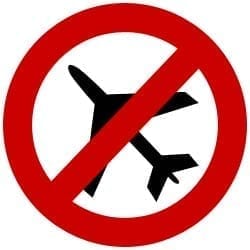The Government has decided to impose a total travel ban for all non-citizens traveling from identified high risk countries to limit the spread of Ebola to South Africa. Unless the travel is considered absolutely essential.
Aaron Motsoaledi , Health Minister says, “South Africans who wish to travel to these countries are requested to delay their travel unless it is also absolutely essential for them to travel.” The high-risk countries are Guinea, Sierra Leone, Liberia – with Nigeria, Kenya and Ethiopia being identified as medium risk. The travel advisory is part of enhanced precautionary measures to prevent the spread of Ebola into South Africa. “All South Africans are hereby advised to avoid non-essential travel to Liberia, Guinea or Sierra Leone. South Africans are not restricted from travelling to these countries, however all returning travellers from these countries will be subjected to rigorous screening and medical assessments before being allowed entry into the country.” “South Africans returning from these countries will have to be subjected to a stricter screening process.” This will include completing a comprehensive health questionnaire before gaining entry back into the country and if the comprehensive medical questionnaire and the temperature screening reveal something, they will have to subject themselves to a complete medical examination. Motsoaledi says, “All travellers and crew members arriving into South African Points of Entry must have completed a travel health questionnaire upon arrival. “If found to have any of the symptoms or signs suggestive of Ebola, they will be referred to one of the designated hospitals for further investigations and management.” Passengers who travelled from or through Guinea, Liberia or Sierra Leone within the last month of arrival into South Arica must undergo additional screening at the Points of Entry. Over 1000 people have died from the virus in West Africa, according to the World Health Organisation. Liberia, Guinea and Sierra Leone have each declared the outbreak a national disaster. Adds Motsoaledi, “Cabinet has noted with concern the extent of the outbreak and the increase of cases in three of these countries, i.e. Guinea, Sierra Leone and Liberia.” “Cabinet recognised that even though the outbreak has been limited to these countries in West Africa, the spread to other countries needs to be contained.” “Containing the outbreak at the source will be essential and limit the spread and mortality caused by the disease to these particular parts of the world.”Countries have been divided into three categories, namely high risk which includes Guinea, Liberia and Sierra Leone, medium risk which includes Nigeria, Kenya and Ethiopia- although some of them do not have Ebola yet; most people travelling from West Africa to South Africa travel via these countries as well as low risk countries.
“For medium and low risk countries, the normal surveillance that has been going on will just be enhanced.“There is a special category of individuals who are South Africans but work there in the mines, communications, security and retail. For these groups, we have called a special meeting tomorrow, which will deal with their unique situation.” Cabinet has established an Inter-Ministerial Committee (IMC) to deal with the coordination of the response. “Funding has also been approved for the Department of Health to the tune of R32.5 million, from the African Renaissance Fund to support containment and prevent further spread of the virus to South Africa and other countries.” “Part of the funds will be used to deploy the mobile laboratory in Sierra Leone, fund transport and accommodation for the team and training for health care workers.” The Minister said the department had taken measures to enhance surveillance, distribute guidelines to all hospitals in public and private sectors, designate health facilities for the treatment of patients, deployed personal protective equipment (PPE) to designated facilities, conducted training, activated outbreak response teams and is operating a hotline for clinicians through the NICD. Preventing Ebola There is no vaccine or specific treatment for Ebola, and many people who get the disease die. Therefore, it is important to take steps to prevent Ebola. Travellers could become infected if they come into contact with blood or body fluids from someone who is sick or has died from Ebola, sick wildlife or meat from an infected animal. Health care providers caring for Ebola patients, family and friends in close contact with an ill person are at highest risk because they may come into contact with blood or body fluids. If you must travel to one of the identified high-risk countries, please make sure to do the following: • Practice careful hygiene. Avoid contact with blood and body fluids of sick persons.
• Do not handle items that may have come in contact with an infected person’s blood or body fluids.
• Avoid funeral or burial rituals that require handling the body of someone who has died from Ebola.
• Avoid contact with wild animals or with bush meat.
• Avoid hospitals where Ebola patients are being treated.
• The South African Embassy or consulate is often able to provide advice on facilities that are suitable for your needs.
• Seek medical care immediately if you develop fever, headache, achiness, sore throat, diarrhoea, vomiting, stomach pain, rash, or red eyes.
• Limit your contact with other people when you travel to the doctor. Do not travel anywhere else. Source – SAnews.gov.za







